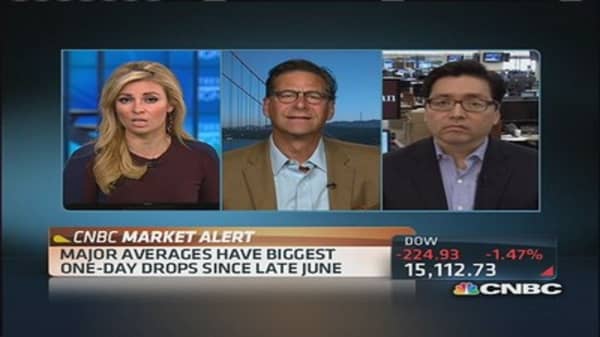"The Fed can think all it wants about tapering, and the bond vigilantes are going to determine what they think is going to happen here," he said. Commodities also moved higher, with gold seeing some short covering and moving up as the dollar moved lower. Oil moved up on concerns about supply after the violence in Egypt.
"The commodities moving up like that and dollar moving down—that might be someone thinking inflation ahead," Cashin said. The Fed has made it clear it is keeping an eye on inflation and that and jobs could help determine whether it slows down on easing.
(Read more: Beware: Market valuation looks like 2007 again)
Thursday's trading was also affected by two high-profile earnings misses: Cisco and Wal-Mart. Traders increasingly have been handicapping what this earnings season says about the next two quarters and whether the expectations are running too high. So far, the S&P companies' profits are up 4.7 percent, but revenues are up only 2.1 percent, according to Thomson Reuters.
Bob Doll, chief equity strategist and senior portfolio manager at Nuveen, said the market is in a pause mode and it will probably stay that way for a while.
"I think the next move up requires stronger revenue and earnings growth, which I believe we'll get, but not today, tomorrow or the next day. So we're in a bit of a pause," Doll said in an interview on "Closing Bell."
Stocks closed at their lows of the day. The Dow tumbled 1.5 percent, or 225 points, to 15,112, after slumping under its 50-day moving average. The S&P's 24-point decline took it to 1,661, just above its 50-day moving average of 1,656. The Nasdaq was off 63 points, or 1.7 percent, at 3,606.
(Read more: Stocks end near lows, Dow skids 200; major averages lower for August)
Oil moved higher as traders worried unrest in Egypt could disrupt supplies. Brent was above $109, and WTI rose just above $107 per barrel.
Gold was up to $1,360.90, a move of over 2 percent, and silver was just under $23, a 5 percent move. Copper also rose half a percent.
"We saw a bunch of stops being triggered. I suspect it's from short covering [in gold]," said Howard Wen, precious metals analyst at HSBC. "We've been in a tight range of $1,270 to $1,350. Recent data from the ETFs shows it's starting to stabilize. Liquidations are starting to stabilize."
Wen said there's been stronger physical demand from India and particularly China. Wen said the gold ETFs were relatively unchanged in the week of Aug. 9, after seeing liquidations in 30 of 32 weeks this year.
The latest AAII sentiment survey showed that optimism fell and pessimism rose to levels not seen since June. Neutral sentiment continued the longest streak of above-average readings going back to the late 1990s. Bullish sentiment, reflecting investors who think stock prices will be higher in six months, fell 5 percent, to 34.5 percent, a 7 percent low. Bearish sentiment rose 1.5 percent, to 28.2.





